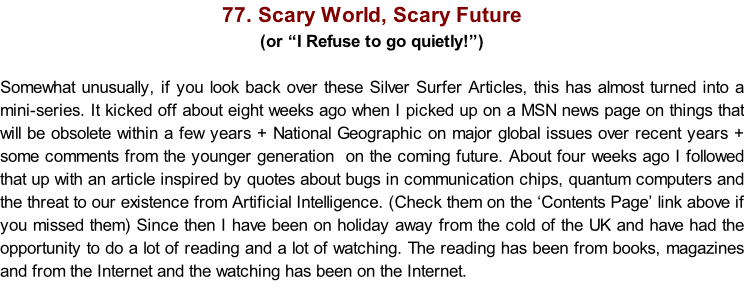







The result of all this, I have found somewhat mind-
OK, pretty dramatic stuff but if you doubt these things, try doing a Google search in the following areas, some of which we have touched upon in the previous two articles:
a) Developments: ‘bit-
b) Social Changes: physical money ceases to be used, face recognition means accountability wherever you are in the world, but also makes travel easier, pandemics that wipe out millions because of overuse of antibiotics causing bacterial resistance
c) Social & National Upheavals: politics through social media, threats to global existence (a nuclear winter, ozone holes, or over population), threats to national security through cyber-
One of the big discussion points at the present (early 2018) could be summarised as the Pessimistic Outlook versus the Optimistic Outlook, i.e. whether this panorama of the future is good news or bad news and does it tell it all anyway? A January edition of Time magazine had as its theme, ‘The Optimists’ and was edited by Bill Gates, who is clearly an optimist, and it carried articles by well over half a dozen writers (including himself) who have a very optimistic outlook on the future. He highlights some good points – worldwide malaria deaths are being cut by 50%, workplace accidents are down over a fifty year period by a factor of fifty, worldwide childhood deaths over the period from 1990 until now, have fallen from 12 million a year to 5 million a year with a goal of 2.5 million by 2030.
If you have a few hours to spare, Google You-
But new technology often comes with fears. For instance the February 2018 edition of National Geographic has as its main theme, ‘The New Big Brother’ which is all about the surveillance society. Try this for a quote: “London authorities were early adopters of widespread closed-
Or try this: “Today more than 2.5 trillion images are shared or stored on the Internet annually to say nothing of the billions more photographs and videos people keep to themselves. By 2020, one telecommunications company estimates, 6.1 billion people will have phones with picture-
Facial recognition and number plate recognition are just tips of the iceberg that are being used to counter criminal activity or simply let you into your pre-
Standing in an airport browsing The Economist’s “The World in 2018” it seemed initially as if these things mattered little with most space given over to politics, states of economies and such things in the first hundred pages, with just a few advertisements covering cyber matters, however the further we browsed, the more even such an erudite publication realised that here was a fertile area of future speculation with the things we’ve been mentioning.
We so often say it on these pages, but the world of today is incredibly different from the world of our childhood, and the signs are clearly there for those who want to look, that the world of fifty years’ time will be unbelievably different from the one our children today know -
You cannot escape the responsibility of tomorrow by evading it today.
Abraham Lincoln
The past cannot be changed. The future is yet in your power.
Unknown
Learn to enjoy every minute of your life. Be happy now. Don't wait for something outside of yourself to make you happy in the future. Think how really precious is the time you have to spend, whether it's at work or with your family. Every minute should be enjoyed and savoured.
Earl Nightingale
Education is the passport to the future, for tomorrow belongs to those who prepare for it today.
Malcolm X
Do not dwell in the past, do not dream of the future, concentrate the mind on the present moment.
Buddha
“Yesterday is gone. Tomorrow has not yet come. We have only today. Let us begin.”
Mother Teresa
“The future depends on what you do today.”
Mahatma Gandhi
